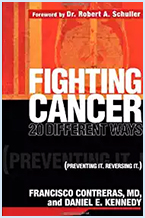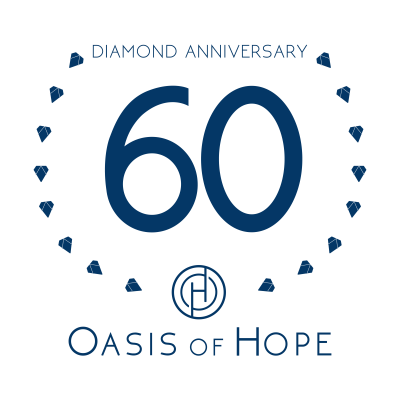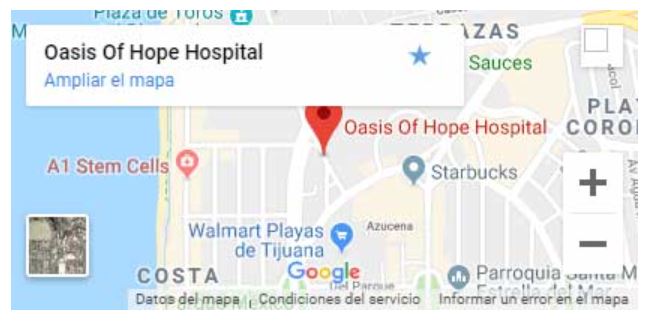Metronimic Chemotherapy
(Low Dose)
at Oasis of Hope
The Place for Alternative Cancer Treatment
A key strategy that Oasis of Hope uses to impede the angiogenic process is called Metronomic Chemotherapy (known as “metronomic” because it is regular and even like the beat of a metronome). This entails the daily use of one or more chemotherapy drugs in a dose so low that no significant toxicity to healthy tissues or side effects result.
During angiogenesis, new endothelial cells are extremely fragile as they branch off from existing blood vessels, multiply, migrate into a tumor in response to chemical signals secreted by tumor cells, and eventually form themselves into tubular structures to give rise to new vessels. Whereas the endothelial cells lining established vessels only rarely multiply, are stabilized by growth factors provided by neighboring cells, and are rarely killed by clinically feasible doses of chemotherapy drugs. The endothelial cells engaged in angiogenesis are extremely sensitive to killing by these drugs, much more so than most cancer cells. Thus, when low-dose chemotherapy is administered on a daily schedule, the continual death of endothelial cells attempting to form new blood vessels can substantially disrupt the angiogenic process, slowing it down notably.
One of the merits of this metronomic approach centers around cancer drug resistance. Whereas conventional, high-dose chemotherapy tends to select tumor cells that are resistant to the drugs used, metronomic chemotherapy targets normal endothelial cells that do not grow resistant to the drugs. In other words, metronomic chemotherapy keeps on working when conventional therapy fails. Tumors may be able to adapt to a degree by increasing their production of pro-angiogenic factors that promote endothelial cells survival. This explains why cancers, which initially regress in response to metronomic therapy sometimes grow back despite continuing therapy. The cancer confers this relative resistance; not the endothelial cells themselves.
Recently, a further benefit of metronomic chemotherapy has been established. It tends to selectively kill a population of immune cells, called “T-reg” cells, that function to suppress the activity of immune cells capable of attacking the tumor. These are the natural killer (NK) cells and T-cytotoxic cells (3). T-reg cells often congregate within tumors and secrete hormone-like factors that “turn off” the immune cells trying to attack the cancer. Thus, metronomic chemotherapy has emerged as a useful adjuvant to therapeutic strategies intended to boost the tumor-killing capacity of NK and T-cytotoxic cells (4,5).
The utility of treating rodent tumors, including transplanted human tumors, with metronomic chemotherapyhas now been confirmed in a great many studies (6,7). In some of these studies, combining such chemotherapy with other measures attacking the angiogenic process has led to complete remissions of pre-existing aggressive tumors (2,8). Other studies also showed that metronomic chemotherapy can be useful when used in conjunction with conventional chemotherapy (9).
The most extensive published clinical experience with metronomic chemotherapy regimens has been provided by oncologists in Milan, who have documented the long-term responses of patients with metastatic breast cancer to a metronomic regimen involving daily cyclophosphamide (50mg) and two weekly doses of methotrexate (5mg per dose) (10,11). From the patients using this regimen, 32% achieved either a complete or partial remission, or a stabilization of disease lasting at least 24 weeks. In about 16% of patients, no tumor progression was noted for over a year. Even in the patients in whom progression did occur, it seems likely that the therapy was often slowing the spread of the disease. The especially good news, since metronomic chemotherapy is intended for long-term use, is that this regimen was essentially free of annoying side effects. Only a mild suppression of white cell count was observed in a small minority of the treated patients.
Since metronomic therapy is directed against endothelial cells, not cancer cells, a metronomic regimen that works well with one type of cancer should work well with all types of cancer dependent on angiogenesis for growth. At Oasis of Hope, we use a metronomic regimen like that tested by the Milanese doctors. It is based on cyclophosphamide, also known by its trade name “Genoxal”. We also include methotrexate for selected patients.
The Oasis of Hope CMIT at-home protocols include additional agents intended to slow the process of angiogenesis. These include salsalate, silymarin, fish oil, the glycine in GPG, and the green tea polyphenols in Synerpax. Thus, we are attacking angiogenesis from as many angles as we feasibly can.
In other words, metronomic chemotherapy keeps on working when conventional therapy fails. Tumors may be able to adapt to a degree by increasing their production of pro-angiogenic factors that promote endothelial cells survival. This explains why cancers, which initially regress in response to metronomic therapy sometimes grow back despite continuing therapy. The cancer confers this relative resistance; not the endothelial cells themselves. One mechanism cancer cells use to suppress the immune system is a special cell called a T-reg cell. These are special lymphocytes that often colonize tumors and kill or disable attacking immune cells by producing immunosuppressive factors. Metronomic chemotherapy is extremely useful for controlling T-reg cells.
Fortunately, T-reg cells are exquisitely sensitive to being killed by small doses of cytotoxic chemotherapy drugs. In fact, the doses are too small to harm other immune cells or cause notable side effects. Remarkably, this is a case where chemotherapy can help boost the immune defense system!












